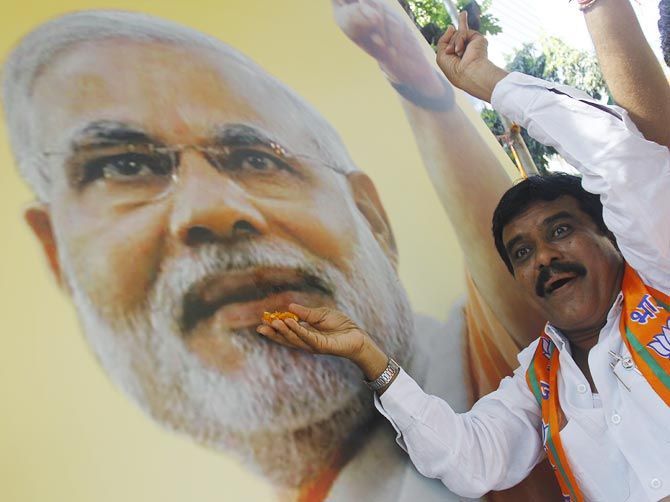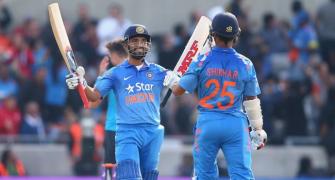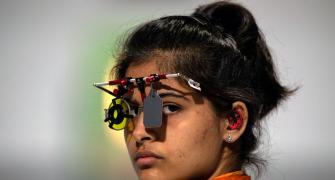 'The Congress has collapsed and is fighting for survival. Other parties carry no weight in comparison to the BJP. This situation does not augur well for democracy,' says Ashutosh.
'The Congress has collapsed and is fighting for survival. Other parties carry no weight in comparison to the BJP. This situation does not augur well for democracy,' says Ashutosh.
A day after the results of the Maharashtra and Haryana assembly elections, it is interesting to read what Dr Ram Manohar Lohia, one of modern India's most novel political thinkers, said about the Jan Sangh, the Bharatiya Janata Party's earlier avatar.
After the 1957 general election, Dr Lohia, who was famous for his sharp tongue, had a very bleak opinion about Hindu political forces. He felt the Jan Sangh along with the Hindu Mahasabha and the Ram Rajya Parishad were dying. 'I need not say anything about the Jan Sangh. Its strength in the dissolved Lok Sabha was three,' Dr Lohia said. 'It has increased to four in the new Lok Sabha. The results don't show any future for the party.'
The Jan Sangh, that was dying and had no future according to Dr Lohia, belied all expectations and scored a fantastic victory in the 2014 parliamentary election. The BJP has continued its spectacular performance in Maharashtra and Haryana. These are states where the BJP was never the main player.
In Maharashtra it played second fiddle to the Shiv Sena for 25 years and in Haryana it was considered a fringe player even a few months ago.
Now, in both states, the BJP will have its own chief minister. Had Dr Lohia been alive he would surely have congratulated Narendra Modi and his team.
Dr Lohia had his political mood swings. In the 1950s he was a firm believer of puritanical politics, not believing in opportunistic alliances or political adjustments for securing power.
But he was a changed man in the 1960s, especially after the third general election when it dawned on him that it was impossible for any single political party to replace the Congress which had gained more seats in the 1962 election.
Dr Lohia concluded that all the political parties sitting in the Opposition had to come together, form a common platform on the basis of a common minimum programme and fight a common enemy. The man who declared the Jan Sangh dead now changed his opinion.
In Socialist leader and Lohaite Madhu Limaye's words, 'Lohia wanted to create a new party in which he would integrate the partial revolutionary fervour of the Communists and the vigour of the Jan Sangh's nationalism.'
Dr Lohia's dream of creating a new party integrating all and sundry did not materialise in his lifetime, but his idea of non-Congressism gained momentum. The seeds of this idea were sown in 1963 when an informal understanding was worked out for the by-elections in four seats.
In his book, Birth of Non-Congressism, Limaye says, 'The Swatantra Party's Minoo Masani was to fight from Rajkot; Acharya (J B) Kripalani, Lohia and Deen Dayal Upadhayay were to contest Amroha, Farrukhabad, and Jaunpur respectively. The informal agreement led to joint electioneering. Since the idea was to prevent division of Opposition votes, Opposition differences were put in cold storage, and fire was concentrated solely on the Congress.'
A few of his comrades were angry with Dr Lohia and felt betrayed by his short-term political 'opportunism,' but it had shown a way and helped Jayaprakash Narayan dislodge the invincible Congress and Indira Gandhi in 1977 when major political parties merged their identities and formed the Janata Party.
Today, an almost similar situation is emerging on the political horizon, but with a different colour. In the pre-1977 era the Congress was too big for one political party to defeat.
The Congress's presence was so overpowering that the Indian political system was known as the Congress system which meant one big all India party and the rest being smaller ones occupying different but very limited geographical spaces including the Jan Sangh which later became the BJP.
The 2014 general election has unmistakably shown that the BJP has captured the space once occupied by the Congress. No one political party can challenge the BJP's might.
The Congress, the political colossus, has collapsed and is fighting for survival with its lowest-ever election tallies. Other parties are region specific and carry no weight in comparison to the BJP outside their geographical boundaries.
This situation does not augur well for democracy. Let us not forget that it was lack of a powerful and concrete Opposition which converted Indira Gandhi into a virtual dictator in her own party and outside leading to the imposition of the Emergency.
A strong government is indeed vital, but in a democracy an equally strong Opposition is required; a weak Opposition is very dangerous for democracy.
Does it mean it is now time to remember Dr Lohia and once again create a replica of non-Congressism?
Since the Centre is now occupied by the BJP, it could be termed 'non-BJPism.' One can argue that it is too early to predict the Congress' doom. One electoral loss does not mean the death of the Congress. In doing so we could be committing the same mistake that Dr Lohia made in 1957 when he pronounced the death of the Jan Sangh.
But a careful look indicates that the Congress has not only lost the central space, it has also conceded ground to the BJP in states which were once its strongholds.
In the north and in the east, the Congress has been virtually non-existent for more than ten years, and in some places for more than 20 years. And there is no sign of it gaining any ground in the near future. The Congress therefore cannot be relied upon to pose any potent opposition to the BJP.
Instead of waiting for its revival, the Congress should initiate a common understanding with smaller parties and arrive at a common agreement. Contesting elections together can be a distant dream, but it can immediately start coordination on the floor of Parliament. This agreement can be enlarged into an institutional framework as understanding evolves over a period of time.
Unfortunately, the Congress has been in government for too long to come to terms with its role as an Opposition party. Its situational political reflexes are dull. If the Congress has to reinvent itself, then it should make the first move to prove that it is ready to play the role of a responsible Opposition party and make the BJP's victory worthwhile for a vibrant democracy like ours.
Ashutosh is a member of the Aam Aadmi Party and a former journalist.
- ALSO READ: 10 key takeways from the election results
- Sunday's verdict will terrify the non-BJP parties
- 'Sonia's blind love for her son has destroyed Congress'
Image: A BJP supporter feeds sweets to a Modi poster at the party’s office in Mumbai. Photograph: Hitesh Harisinghani/Rediff.com










